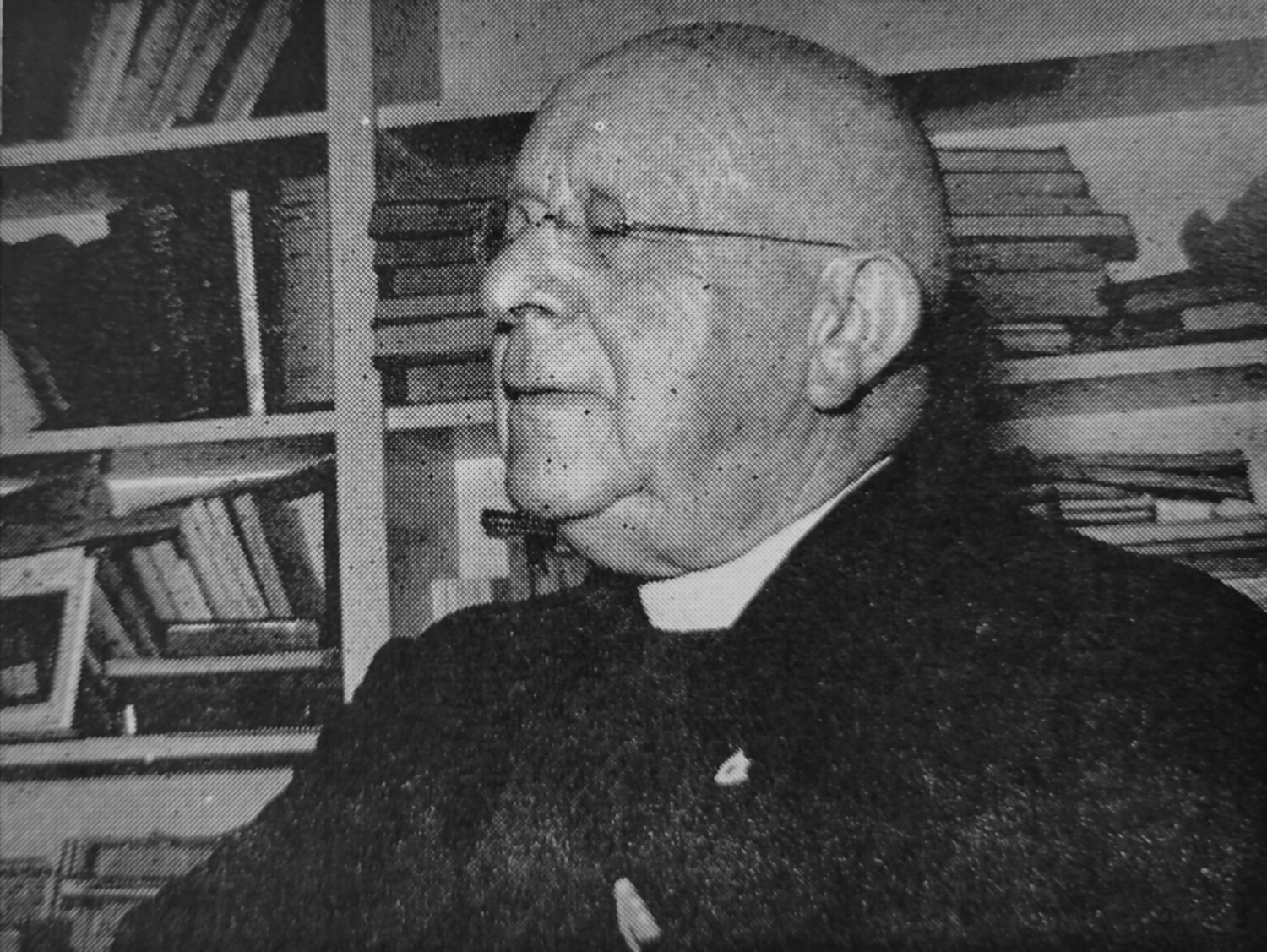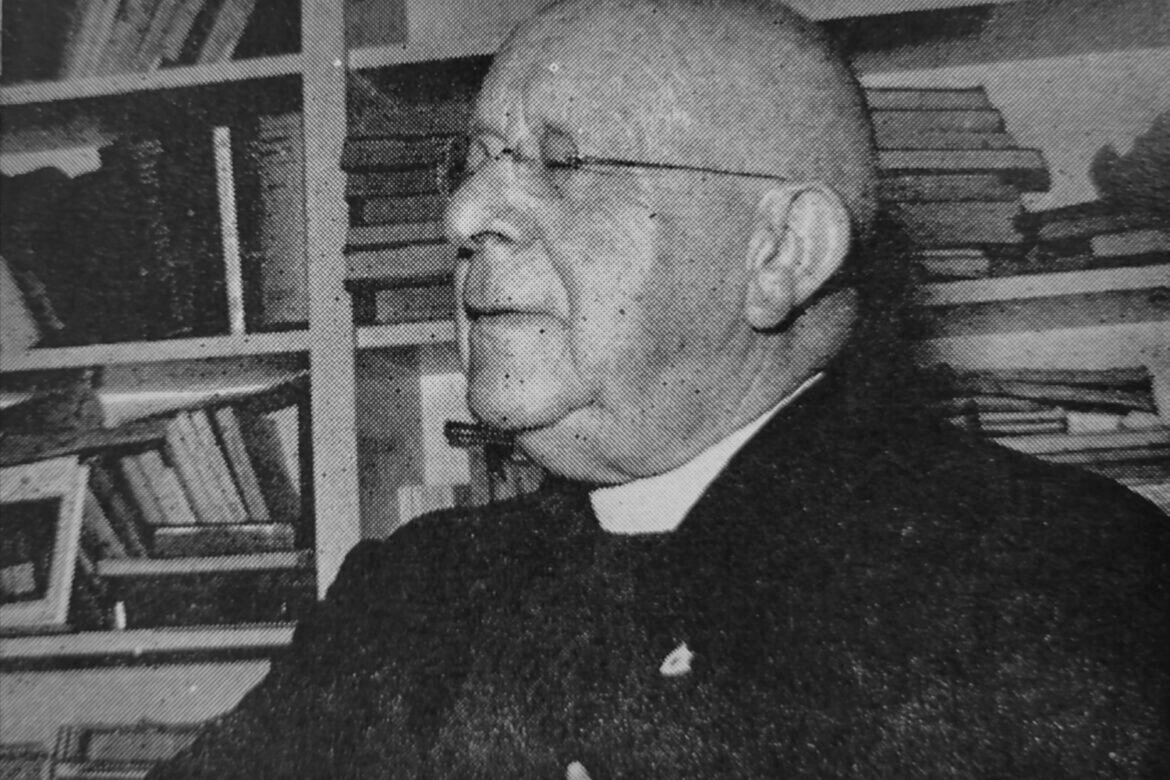Desmond Bill Talks to Msgr. Bradley
Desmond Bill
Volume 39 Issue 4, 5 & 6 | Posted: July 16, 2024

Even when he was skeptical student at Oxford, John Leo Bradley wanted to be a Catholic priest.
“It was most unreasonable but there it was,’ he says disarmingly, recalling those days in the early 1900s.
He is 80 now and has been a priest for 50 years. It is the only one of his early ambitions he has achieved.
But that doesn’t bother Monsignor Bradley, D P. He says, “The life I have had is not what I would have chosen. But it has been the Divine Will.”
And he still hopes that he will be allowed what has become the main desire of his later life – to go and live with the Indian people to whom he has been a missionary for many years.
His life has come full circle. He started out as a student in an Anglican College in England, became a Catholic in Rome and ended up as a missionary on Vancouver Island.
He says he got here because this diocese is the only one that would take him in the special circumstances of his life after he converted to Catholicism. Even after all these years he can still recall them only with deep feeling.
COMPLETE SKEPTIC
The first time he entered a Catholic church he ran in fear and terror. He was about 10 years old then and his father almost gave him a licking for going inside the Catholic church in the village where they lived in Derbyshire, England. Msgr. Bradley said only his mother’s intercession saved him.
He says that even then he wanted to be a Catholic priest. He doesn’t know why. He studied as a young man at an Anglican theological college where, as he says, “The study of history showed me that whatever the Anglican church was it was not the historic church of Christendom.”
He quickly lost all faith and when he went up to Oxford he was a complete sceptic “at the very least.” But he was still studying theology and agonizing over his desire to be a priest without being able to believe in Christ.
His problem was not accepting the Catholic Faith: “I knew that if Jesus is the Lord God Almighty then the Roman Catholic Church is the one and only true faith.” His attitude to the Church was like that of Newman who wrote ‘Oh that thy faith were true’.
Coming down from Oxford, where he avoided taking the examinations that would have resulted in his being ordained an Anglican clergyman, he taught for a year at an Anglican college. “It was a very nice place and they had a very nice English religion. They were quite delightful people; quite fascinated with religion even though many of them didn’t believe in its presuppositions.”
A year was enough, for both him and the college authorities. He left and lived by tutoring an English family. All the while he agonized over what he believed about Christ.
NEVER A DOUBT
With his pupils he went on a European tour that took him to Rome. He had decided to go to Rome before making up his mind on religion In Rome he went to the church on the Chaldean Hill named after St. Gregory, the apostle to the English.
“I went in. His bed is there and the chair in which he used to sit. I knelt before the chair and I asked God and prayed to St. Gregory that if the Catholic faith were true I might embrace that faith.
“I remember coming out of that church and my mind was made up. I had no illumination or anything like that. I simply knew I would become a Catholic. I have never known what it was like to have a doubt since then.”
Back in England he was received into the Church by a famous Benedictine, Don Chapman, later to be Abbott of Downside Abbey. For one year he taught at Beaumont college, and tried to enter the Society of Jesus but was told his health was not good enough.
NO BISHOP
The Jesuits promised they would re-consider his application if he became a priest and his health improved. But he could not find a bishop to sponsor him for the priesthood when he told them that his intention was to go into a religious order if his health ever became good enough.
Finally a friend suggested he write to Bishop Alexander MacDonald on Vancouver Island. Bishop MacDonald agreed to accept him as a student for the priesthood even though he knew the young seminarian might join an order instead of coming here.
ROME, VICTORIA, RUSSIA
The bishop paid for Msgr Bradley’s study at the Collegio Beda in Rome and later at the University of Fribourg in Switzerland. He went to Fribourg because his health broke in Rome. At the time he was so ill that all he was capable of was one hour’s study a day.
But in 1915 he was ordained in Switzerland and in January 1916 he arrived on Vancouver Island. He did not stay long. He was appointed a chaplain in the Canadian army and sent to France. There he transferred to the British forces and served with the expeditionary Force that was sent to northern Russia after the Bolsehvik Revolution in that country. He didn’t get back to the diocese of Victoria until 1922.
GO AND LIVE AMONG THEM
For many years Msgr Bradley was engaged in parish work in Victoria and up-Island but gradually he became more and more involved in the Indian missions. Says he, “If you really know the Indians you wouldn’t want to work with anyone else.”
He thinks there is no one like them. “They can be magnificent and often are. It almost seems as if God wants heroic virtue from them and if ,they are not all full of it that it is not surprising. But heroic virtue is what really makes them stand out.”
He thinks the Church has failed to preach the Gospel to the Indians the way it should. The fundamental reason for the failure, he thinks, is that missionary work with the Indian people requires devotion so utter that it is difficult for men to be capable of it. Something of the Indian must enter into you and you must rid yourself of many white points of view You must surrender yourself completely and, like Father Brabant, the early missionary on the West Coast, go and live among them.”
That is what he has wanted to do for many years but circumstances have prevented him. He still hopes that he will be allowed to do his missionary work in this way however.
MUCH MORE SINCERE
He says that if Catholicism does take with an Indian it takes very thoroughly. “They are much simpler than English people. They are much more sincere.”
And he illustrates his point by telling of the most remarkable man he ever met in Canada – an Indian who died during an epidemic on a reserve. Msgr. Bradley went to visit him in his cabin
“I shall never forget him, never, never, never. His bed was heaped with rags; it was so heaped and his body was so emaciated that there was no outline of him in the bed.
“I could just see his head emerging at the end like a skull with flesh drawn tightly over it. I could see he was dying and I began to say a few words such as a priest might say in those circumstances.
“And then he began to speak. I never heard such words from any man. Such utter surrender; such utter contentedness; such utter longing for Heaven. It was so simple to him; as simple as two-and-two make four.”
“I said to myself, this is no place to talk and so I shut up. I knelt down by the bed and said a few prayers with him. I know where he is buried but I don’t to this day know his name. But I never met another man like him.”
Desmond Bill

